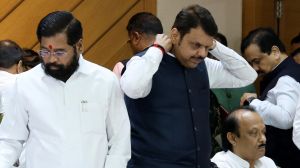Stay updated with the latest - Click here to follow us on Instagram
Pulling up PMO for sitting on Raja plea,Supreme Court calls for faster sanction
Allows Swamys plea; Calls for 4-month deadline,after which sanction deemed to be granted.
Noting that a private citizens fight to prosecute a public servant for corruption should not transform into an endless wait for government sanction,the Supreme Court today said the government should either decide on a sanction request within four months or it should be considered as given.
Framing guidelines for the Parliament to enact,Justice A K Ganguly,in his separate judgment,went a step further than his companion judge,Justice G S Singhvi,with his call for the amendment of Section 19 of the Prevention of Corruption Act,1988. Section 19 mandates that a proposal to prosecute a public servant for corruption would require prior sanction from the public authority concerned. It,however,does not give a deadline by which the government should decide on a sanction request.
Allowing Janata Party President Subramanian Swamys petition against the Delhi High Court judgement refusing to direct the Prime Minister on his plea for prosecution of Raja,the apex court upheld the right of a private citizen to seek sanction for prosecution of a public servant for corruption.
Dismissing the Attorney Generals submissions that Swamy,as a private citizen,did not have the locus standi to seek sanction for Rajas prosecution,Justice Singhvi said that anyone can set or put the criminal law in motion provided it is not contra-indicated by a statutory provision.
Justice Ganguly pointed to how the guideline in the Vineet Narain case judgment of 1998 for a three-month time-limit to decide on a sanction request has so far been ignored. This trend to delay the decision from sanctioning authorities,Justice Ganguly said,tires effort to put the corrupt on the dock.
In his judgment,Justice Ganguly reminded lawmakers of the 1998 verdict and reiterated that government should decide all sanction requests both from a private citizens as well as prosecution agencies inside of three months. The sanctioning authority,in case any consultations with law officers are required,can extend the time limit up to another month.
To this,the judge added his own guideline: At the end of the extended time limit,if no decision (from the sanctioning authority) is taken,the sanction will deemed to have been granted to the proposal for prosecution.
Subsequently,Justice Ganguly added,the private citizen or prosecution agency can go ahead and file chargesheet within the next 15 days in a court to commence prosecution.
Reasoning why he wants to tighten the leash on the sanction law,Justice Ganguly explained that delay in granting sanction thwarts a very valid social purpose,namely,the purpose of a speedy trial with the requirement to bring the corrupt to book.
The judge,who is retiring on February 3,observed that while prior sanction is itself a fetter,delay kills the spirit.
Public servants are treated as a special class of persons enjoying the said protection so that they can perform their duties without fear and favour and without threats of malicious protection. However,the said protection extended in public interest cannot become a shield to protect corrupt officials, Justice Ganguly said.
Though having given separate judgments,both judges concurred to vindicate Prime Minister Manmohan Singh,personally,from any blame in delaying to reply to a series of letters from Janata Party leader Subramanium Swamys seeking sanction to prosecute then telecom minister Andimuthu Raja in the 2G Spectrum allotment case.
In its lone reply to Swamys missives,the DoPT,in March 2010,told him that his request for sanction was premature,and the CBI was already investigating the case. The Delhi High Court too had dismissed Swamys petition on the same ground,after which he had approached the SC in 2011.
In todays judgment,both judges agree that the Prime Minister was ill-advised by his staff at the PMO while dealing with Swamys allegations in the case.
The officers in the PMO and the Ministry of Law and Justice were duty bound to apprise the Respondent No 1 (Manmohan Singh) about the seriousness of allegations made by Swamy and the judgments of this court. By the very nature of the office held by him,the PM is not expected to personally look into the minute details of each and every case placed before him and has to depend on his advisors and other officers, Justice Singhvi said.
Noting that Swamy himself had refused to blame the PM for the delay,Justice Singhvi agreed that had the PM been apprised of the true factual and legal position regarding the representation made by Swamy,he would have surely taken appropriate decision and would not have allowed the matter to linger.
Pitching in with his support to the PM,Justice Ganguly quotes from the Shakespearean drama Henry,The Fourth: Uneasy lies the head that wears the crown.







